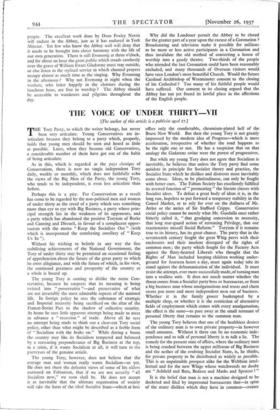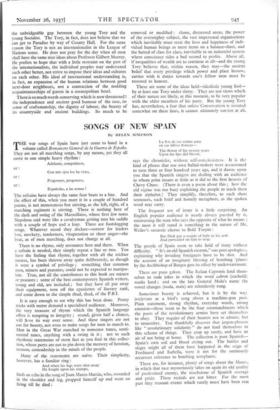THE VOICE OF UNDER THIRTY VII
The author of this article is a publicist aged 27.] THE Tory Party, to which the writer belongs, has never been very articulate. Young Conservatives are in- articulate because they belong to a party which, properly, holds that young men should be seen and heard as little as possible. Later, when they become old Conservatives, a considerable number of them have got out of the habit of being articulate.
As in this, which is regarded as the pays classique of Conservatism, there is now no single independent Tory daily, weekly or monthly, which does not faithfully echo the views of the Big Men of the Party, the young Tory, who tends to be independent, is even less articulate than before.
Perhaps this is a pity. For Conservatism as a result has come to be regarded by the non-political men and women of under thirty as the creed of a party which sees something more than eye to eye with Big Business, a party whose prin- cipal strength lies in the weakness of its opponents, and a party which has abandoned the positive Toryism of Burke and Canning and Disraeli, in favour of a complacent oppor- tunism with the motto " Keep the Socialists Out " (with which is incorporated the comforting corollary of " Keep Us In ").
Without his wishing to belittle in any way the fine stabilising achievements of the National Government, the Tory of under thirty may be permitted an occasional feeling of apprehension about the future of the great party to which he owes allegiance, and with the future of which, in his view, the continued greatness and prosperity of the country as a whole is bound up.
The young Tory is coming to dislike the name Con- servative, because he suspects that its meaning is being twisted into " preservative "—and preservative of what are not invariably the most admirable aspects of the national life. In foreign policy he sees the substance of strategic and Imperial necessity being sacrificed on the altar of the Franco-Soviet Pact to the shadow of collective security. At home he sees little apparent attempt being made to meet in advance a " recession " of trade. Above all he sees no attempt being made to think out a clear-cut Tory social policy, other than what might be described as a feeble form of " Socialism with the brake on." While during a boom the country may like its Socialism tempered and balanced by a reassuring preponderance of Big Business at the top, in a crisis, if it wants Socialism at all, it will turn to the purveyors of the genuine article.
The young Tory, however, does not believe that the average man and woman really wants Socialism—as yet: He does not share the defeatist views of some of his elders nurtured on Fabianism, that if we are not actually " all Socialists now," we soon shall be. He does not accept it as inevitable that the ultimate organisation of society will take the form of the ideal Socialist State—which at best offers only the comfortable, chromium-plated hell of the Brave New World. But then the young Tory is not greatly impressed by the modem idea of Progress—which is mere acceleration, irrespective of whether the road happens to be the right one or not. He has a suspicion that on that analogy the Gadarene swine were the purest of progressives.
But while my young Tory does not agree that Socialism is inevitable, he believes that unless the Tory party find some antidote in principle for Socialist theory and practice, the Socialist State which he dislikes and distrusts must inevitably come about. Ideas, to be platitudinous, can only be fought with better ones. The Fabian Society has excellently fulfilled its avowed function of " permeating " the literate classes with Socialist ideas. To defeat a great body of ideas it is, in the long run, hopeless to put forward a temporary stability in the Consol Market, or to rely for ever on the dullness of Mr. Attlee or the antics of Sir Stafford Cripps. Conservative social policy cannot be merely what Mr. Guedalla once rather bitterly called it, " that grudging concession to necessity, that long rear-guard action of retreating Privilege, that our reactionaries miscall Social Reform." Toryism if it remains true to its history, has its great chance. The party that in the seventeenth century fought the great Whig peers with their enclosures and their insolent disregard of the rights of common men; the party which fought for the Factory Acts against the flinty-hearted Liberals who thought that the Rights of Man included keeping children working under- ground for fourteen hours a day, must again today take its stand against the dehumanisation of the individual. It must resist the attempt, ever more successfully made, of turning man into a soulless unit. It does not much matter whether the threat comes from a Socialist party boss or bureaucrat, or from a big business man whose amalgamations and trusts and chain stores put more and more independent men out of business. Whether it is the family grocer bankrupted by a multiple shop, or whether it is the restriction of alternative fields of employment which comes with every amalgamation, the effect is the same—to pare away at the small remnant of personal liberty that remains to the common man.
The young Tory believes that one of the healthiest desires of the ordinary man is to own private property—in however small amounts. Without it there can be no economic inde- pendence and to talk of personal liberty is to talk a lie. The remedy for the present state of affairs, where the ordinary man is being crushed between the upper millstone of Big Business and the nether of the evolving Socialist State, is, he thinks, for private property to be distributed as widely as possible. This is an unpalatable prospect alike for the Webbian intel- lectual and for the new Whigs whose watchwords no doubt are " Ashfield and Bata, Bedaux and Marks and Spencer ! "
It is the belief that man is not a machine designed to be docketed and filed by impersonal bureaucrats that—in spite of the many dislikes which they have in common—creates the unbridgeable gap between the young Tory and the young Socialist. The Tory, in fact, does not believe that we can get to Paradise by way of County Hall. For the same reason the Tory is not an internationalist in the League of Nations sense. He does not pray for the day when all men shall have the same nice ideas about Professor Gilbert Murray. He prefers to hope that with a little restraint on the part of the internationalists, the individual peoples may understand each other better, not strive to impose their ideas and cultures on each other. His ideal of international understanding is, in fact, an expansion. of the human relations between good next-door neighbours, not a contraction of the nodding acquaintanceships of guests in a cosmopolitan hotel.
There is so much worth conserving which is now thzeatened : the independence and ancient good humour of the race, its sense of craftsmanship, the dignity of labour, the beauty of its countryside and ancient buildings. So much to be removed or modified : slums, distressed areas, the power of the overmighty subject, the vast impersonal organisations which inevitably must treat the lives and happiness of indi- vidual human beings as mere items on a balance-sheet, and the hatred of class for class, inevitable in an industrial system where conscience rides a bad second to profits. Above all, if inequalities of wealth are to continue at all—and the young Tory believes that, within reason, they may—the ancient belief that every privilege which power and place bestow, carries with it duties towards one's fellow men must be restored to honour.
These are some of the ideas held—idealistic young fool— by at least one Tory under thirty. They are not views which of their nature are likely, at this moment, to be very popular with the older members of his party. But the young Tory has, nevertheless, a fear that unless 'Conservatism is restated somewhat on these lines, it cannot ultimately sur give at all.















































 Previous page
Previous page